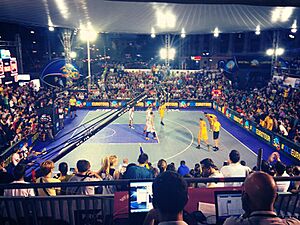3x3 basketball facts for kids
 |
|
| Highest governing body | FIBA |
|---|---|
| Characteristics | |
| Contact | Yes |
| Team members | 4 (3 on court) |
| Mixed-sex | Single or mixed |
| Type | Indoor or outdoor |
| Equipment | Basketball |
| Presence | |
| Olympic | Youth Olympic Games since 2010 European Games since 2015 Olympic Games since 2020 Commonwealth Games from 2022 |
3x3 basketball (say "three-ex-three") is a fun and fast version of basketball. It is played with three players on each team. The game uses only one basket and a half-court.
FIBA, the main group for basketball around the world, helps organize and promote 3x3. They have a big yearly competition called the FIBA 3x3 World Tour. This tour includes many smaller events and a big final game. Winners can earn a lot of prize money. There are also FIBA 3x3 World Cups for men and women. These are the top tournaments for national teams. 3x3 basketball is now even an Olympic sport! It was first played at the 2020 Summer Olympics and the 2022 Commonwealth Games.
Contents
How 3x3 Basketball Started
People have played 3x3 basketball on streets and in gyms for a long time. It was usually played in a casual way. In the late 2000s, rules for 3x3 games started to become more standard. This happened a lot through tournaments like Gus Macker and Hoop It Up in the United States. These events brought together many teams and players. In 1992, Adidas also started its own streetball competition. Since then, more and more 3x3 events have grown worldwide.
FIBA first tried out 3x3 at the 2007 Asian Indoor Games in Macau. More test games happened in 2008 in the Dominican Republic and Indonesia. The first international game was at the 2009 Asian Youth Games. Nineteen boys' teams and 16 girls' teams played. All games were at Anglican High School in Tanah Merah, Singapore.
3x3 made its big worldwide debut at the 2010 Summer Youth Olympics in Singapore. Twenty teams played in both the boys' and girls' groups. The games were held at the Youth Space. Since then, world championships for both adults and players under 18 are held regularly. FIBA has worked hard to make 3x3 its own sport. It now has its own rules and regular competitions. 3x3 basketball became an Olympic sport at the 2020 Summer Olympics.
Other tournaments also use the 3x3 basketball style. These include Spokane Hoopfest and the Nike 3ON3 Tournament.
Rules of the Game
FIBA has special rules for 3x3 basketball. These rules add to the regular basketball rules. If a situation is not covered by the 3x3 rules, the normal FIBA basketball rules apply. The latest rules were put out in August 2019.
Here are some ways 3x3 rules are different from regular full-court basketball:
Teams and Players
Each team has three players on the court and one substitute player. A team must have three players on the court when the game starts.
Court and Ball
The game is played on half of a basketball court with one basket. The official court is 15 meters (about 49 feet) wide. It is 11 meters (about 36 feet) long. However, half of a regular FIBA court is also fine for official games.
The ball used is a size 6 basketball. This is the same size used in women's full-court games. But it has the weight of a size 7 ball. This is the size used in men's full-court games.
How to Play
- A coin toss decides which team starts with the ball. The winning team can choose to start with the ball or get the ball first in overtime.
- The game starts with the defensive team passing the ball to the offensive team.
- All offensive players must start outside the arc (the curved line on the court). Defensive players must start inside the arc.
- The game is one period, lasting a maximum of 10 minutes.
- The first team to score 21 points wins the game right away.
- If no team reaches 21 points, the team with the higher score after 10 minutes wins.
Scoring Points
- A successful shot from inside the arc, including free throws, is worth one point.
- A successful shot from outside the arc (a "downtown" shot) is worth two points.
After a Score
- After a team scores, a player from the other team takes the ball directly under the basket.
- They must dribble or pass the ball to a spot behind the arc to restart play.
- The defense cannot try to steal the ball inside the small semi-circle under the basket.
- If players hold the ball at the same time, the defensive team gets possession.
Time Limits
- The offensive team must shoot for a goal within 12 seconds.
- An offensive player cannot dribble with their back or side to the basket inside the arc for more than 3 seconds.
- If either of these rules are broken, the defensive team gets the ball.
Overtime Rules
If the game is tied at the end of 10 minutes, there is an overtime period.
- There is a one-minute break before overtime starts.
- The team that started the game on defense gets the ball first in overtime.
- The first team to score two points in overtime wins the game.
- Even if a team reaches 21 points in overtime, they must still score two points to win.
Substitutions and Timeouts
- Players can only substitute when the ball is dead (not in play).
- A substitute enters from behind the end line opposite the basket.
- The substitution is official when the player leaving the game touches the substitute.
- Each team gets one 30-second timeout per game.
Fouls
- Most fouls add one point to the team foul count.
- A foul during a shot inside the arc gives one free throw.
- A foul during a shot outside the arc that misses gives two free throws.
- If a team has 7, 8, or 9 team fouls, the other team gets two free throws.
- If a team has 10 or more team fouls, the other team gets two free throws and possession of the ball.
- Unsportsmanlike fouls (bad behavior) result in two free throws. A second unsportsmanlike foul or a very serious foul means the player is removed from the game.
- If a team's players are all removed, they lose the game.
- Technical fouls (rule breaking that isn't physical contact) result in one free throw.
- Offensive fouls (fouls by the team with the ball) usually do not result in free throws.
Growing the Sport
FIBA sees 3x3 as a great way to make basketball more popular worldwide. Patrick Baumann, a leader at FIBA, said that 3x3 has all the skills of basketball. He believes it will inspire many great players. He also said it is an easy way to get young people involved in basketball. It helps promote important values to new generations.
FIBA uses a special plan to grow 3x3. They have created an online community. This community keeps track of all FIBA-approved 3x3 events around the world. All players get a personal world ranking based on points they earn at these events.
Any event can become FIBA-approved. They just need to use FIBA's free software, EventMaker, to organize the event. All approved 3x3 events are part of an official network of competitions. The top of this network is the FIBA 3x3 World Tour. Teams can qualify for the World Tour by playing in special qualifying events.
The National Basketball Association (NBA) in North America also supports 3x3. Since 2016, the NBA has held summer tournaments called "Dew NBA 3X." Local players compete for prizes. The winners go on to the USA Basketball national 3x3 championship. They might even represent their country internationally. These tournaments also have live music, shooting contests, and video game competitions. Current NBA players sometimes appear too.
In 2017, entertainer Ice Cube started a league called BIG3. This league features former NBA and college basketball stars. They play with rules that are a bit different from FIBA's. They also use a different ball.
Getting into the FIBA 3x3 World Cups is different from regular basketball. It's designed to help the sport grow all year. National teams qualify based on their country's official 3x3 ranking. This ranking also looks at individual player rankings. Even if a country's ranking is high enough, FIBA wants teams from many different countries to play. This means it can be harder for one country to send both a men's and women's team. For example, the US women's team qualified for the 2018 World Cup, but the men's team did not. Playing in a FIBA-approved 3x3 event earns ranking points. Some countries, like Andorra, have many people playing every weekend. This helps their ranking.
World Cups
After the 2010 Summer Youth Olympics, FIBA started a regular World Cup. It includes men and women competing at the same time. There are categories for open age groups, under 23, and under 18. World Cups happen every year. They do not happen in years when there are Youth Olympic Games or Olympic Games. The 2020 event was canceled because of the COVID-19 pandemic.
To qualify for the World Cup, teams use the 3x3 Federation Ranking. This ranking lists all national basketball groups. It is based on the points of their top 100 players in each group (men, women, U23 men, U23 women, U18 men, U18 women).
International Games
3x3 basketball became a regular event at the European Games. It was first played at the 2015 European Games in Baku, Azerbaijan.
3x3 basketball made its Olympic debut at the 2020 Summer Olympics in Tokyo, Japan. Both men's and women's teams competed.
3x3 basketball was also part of the 2022 Commonwealth Games in Birmingham, England.
After the 2022 Russian invasion of Ukraine, FIBA stopped Russian teams and officials from playing in FIBA 3x3 Basketball competitions.
Major Event Medal Winners
Olympic Games
- Men
| Event | Gold | Silver | Bronze |
|---|---|---|---|
| Tokyo 2020 |
Agnis Čavars Edgars Krūmiņš Kārlis Lasmanis Nauris Miezis |
Ilia Karpenkov Kirill Pisklov Stanislav Sharov Alexander Zuev |
Dušan Domović Bulut Dejan Majstorović Aleksandar Ratkov Mihailo Vasić |
| Paris 2024 |
Jan Driessen Dimeo van der Horst Arvin Slagter Worthy de Jong |
Lucas Dussoulier Timothé Vergiat Jules Rambaut Franck Seguela |
Šarūnas Vingelis Gintautas Matulis Aurelijus Pukelis Evaldas Džiaugys |
- Women
| Event | Gold | Silver | Bronze |
|---|---|---|---|
| Tokyo 2020 |
Stefanie Dolson Allisha Gray Kelsey Plum Jackie Young |
Evgeniia Frolkina Olga Frolkina Yulia Kozik Anastasia Logunova |
Wan Jiyuan Wang Lili Yang Shuyu Zhang Zhiting |
| Paris 2024 |
Marie Reichert Elisa Mevius Sonja Greinacher Svenja Brunckhorst |
Vega Gimeno Sandra Ygueravide Juana Camilión Gracia Alonso de Armiño |
Dearica Hamby Cierra Burdick Hailey Van Lith Rhyne Howard |
See Also
 In Spanish: Baloncesto 3×3 para niños
In Spanish: Baloncesto 3×3 para niños
- 3x3 basketball at the Summer Olympics
- Basketball at the Commonwealth Games
- FIBA 3x3 World Cup
- FIBA 3x3 Europe Cup
- FIBA 3x3 U18 World Cup
- BIG3 – A 3x3 basketball league with different rules, often played by retired NBA players.
- Gus Macker – 3x3 tournaments in the US that also use different rules.
- Twenty-one – Another basketball game where teams must score exactly 21 points to win.
 | Georgia Louise Harris Brown |
 | Julian Abele |
 | Norma Merrick Sklarek |
 | William Sidney Pittman |



